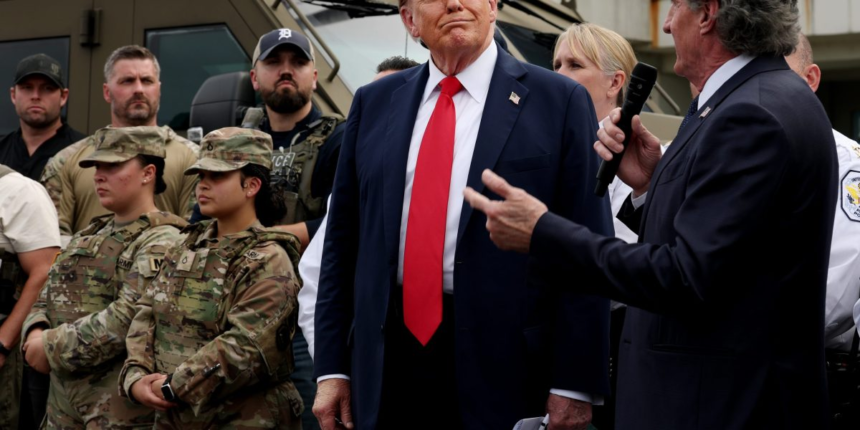Deflection is not protection, unless you are President Donald Trump, desperate to divert national attention away from your own self-inflicted crises, failures, and ongoing legal problems. Sounding false alarms over public safety despite falling crime rates, Trump is manufacturing misinformation to lead a dangerous military war on his own American cities as a dodge from accountability while, paradoxically, degrading public safety.
As experts on leadership, governance, community policing, counterterrorism, and military training, we condemn Trump’s dangerous erosion of public safety and outline how to fortify law enforcement. Trump’s grandiose displays of brute force—the massing of weapons of war and platoons of masked, unidentified combat fighters targeting the very civilian populations they are commissioned to protect—does not bring reassurance.
City leaders also insist the crackdown is unnecessary and destabilizing, pointing to data showing violent crime is already declining. Mayor Muriel Bowser has pushed back on Trump’s characterization of the city, calling his actions both a photo op and a gross militarization of the nation’s capital. She tweeted that “American soldiers and airmen policing American citizens on American soil is #UnAmerican.”
Trump has since ordered thousands of soldiers from the National Reserves and federalized law enforcement officers to converge on Washington, with exaggerated assertions of crime, to divert the public narrative away from his own legal challenges and on public safety instead.
One of us who has trained the nation’s military forces for decades at West Point warns that people who are trained to kill in battle are not trained in assisting distressed citizens in emergency healthcare or aiding those in mental distress, let alone handling traffic stops, routine arrests, domestic violence, or peacefully calming neighborhood disputes. Military reservists are civilians who jump back into uniforms to assist heroically in natural disaster recovery, provide humanitarian assistance, or to fortify regular combat divisions in battles around the world. Wearing them out in the wrong jobs makes them less available for such national priorities.
More importantly, most of the Guardsmen are not Military Police or Special Ops, meaning they are not well-trained to carry or shoot the handguns they have been armed with. Thus, the probability of innocents being killed or wounded in these deployments is high.
Militaries are designed to win wars: They are trained in Rules of Engagement (ROE), which define the parameters of the use of force on a battlefield. These are governed by the laws of armed conflict (LOC), and provide a framework for identifying appropriate military targets; once identified, they can be eliminated. By contrast, law enforcement are trained in rules on the use of deadly force. Under this paradigm, deadly force is appropriate only when the officer has a reasonable belief that the subject poses an imminent threat to the officer or another person. Their actions are governed by the Constitution of the United States: The goal is to “neutralize the threat,” not “shoot to kill.”
These are very different mindsets. Having individuals who view American streets as a military battlefield, rather than a community whose overall well-being they are trained to protect, is a recipe for disaster.
Another of us who has led counterterrorism initiatives at the FBI similarly is concerned about the distraction from genuine protection against foreign terrorist plots and international gangs and domestic mass shootings and kidnappings. Instead, soldiers have been needlessly assigned to stand around train stations and monuments, like statues themselves.
Over 2,000 years ago, the vainglorious emperors and conquering generals of the ancient Roman Empire would arrange massive public salutes to themselves in famous Roman Triumphs where they would surround themselves with armed, uniformed soldiers and cheering crowds to celebrate and sanctify their victories with divine-like imagery. While President Trump may not have been a classics scholar, he certainly tried to model the tradition of such grandiose fanfare. But his classics lesson is backfiring.
As Benjamin Franklin advised 270 years ago, “They who would give up essential Liberty, to purchase a little temporary Safety, deserve neither Liberty nor Safety.”
The authors would like to thank Steven Tian from the Yale Chief Executive Leadership Institute for their research.
The opinions expressed in Fortune.com commentary pieces are solely the views of their authors and do not necessarily reflect the opinions and beliefs of Fortune.









